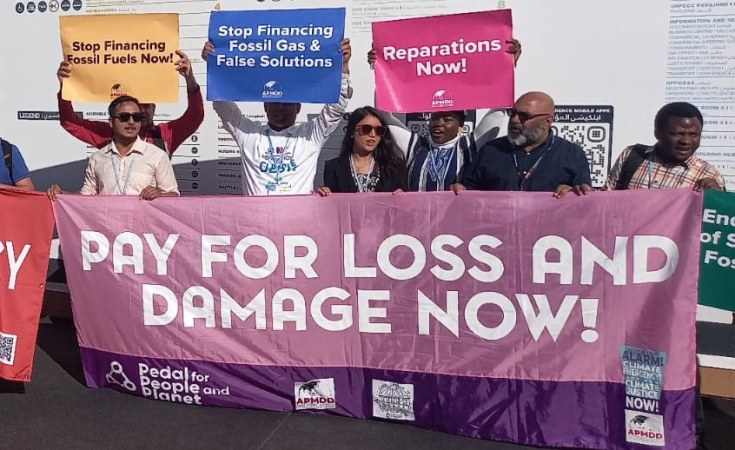Bonn — The Climate Change envoy to the President of Kenya has asked Kenya's and, by extension Africa's negotiators at the ongoing climate conference in Bonn, Germany, not to put much emphasis on financing the Loss and Damage kitty but instead calls for fairness and equity.
"Loss and damage remain an important issue; we hope it will be operationalized in Dubai, but whatever amount that may go to the kitty will not take us anywhere as a global community," Ali Mohamed, who advises the President on matters climate change told Kenya's delegation in Bonn, shortly after President William Ruto demanded that COP28 be the last round of global negotiations on climate change.
The Loss and Damage funding is an agreement reached during the 27th round of climate negotiations in Egypt to support vulnerable countries hit hard by climate disasters that include cyclones, floods, severe droughts, landslides, and heat waves, among others.
During the opening ceremony of the UN Habitat Assembly in Nairobi, Ruto said that it is possible to stop the conversation and the negotiation between North and the South because "climate change is not a North/South problem, it is not about fossil fuel versus green energy problem, it is a problem that we could sort out all of us if we came together," he said. Ruto is the current Chair of the Committee of African Heads of State and Government on Climate Change (CAHOSCC).
According to Ruto, it is possible (for African negotiators) to agree on a framework that will bring everybody on board for the continent to go to COP28 with a clear mind on what should be done and how Africa and the global South can work with the global North, not as adversaries, but as partners to resolve the climate crisis and present an opportunity to have a win-win outcome that has no finger pointing.
In Bonn, Mohamed, who is also the Permanent Secretary for the Ministry of Environment and Forestry, told Kenya's negotiators that, as Africans, there is a need to raise voices and call for a new global architecture and a new way of doing things.
He gave an example of the Special Drawing Rights (SDR) during the period of COVID-19, where Europe, which has a population of 500 million people, received over 40 percent, while the entire African continent, with a population of 1.2 billion people received a paltry five percent of the total funds.
"This kind of unfairness is what President Ruto wants to take forward and say it is no longer tenable in the new world order," said Mohamed, who is vying to become the next Chair of the Africa Group of Negotiators (AGN) for the next three years.
The SDR is an interest-bearing international reserve asset that supplements other reserve assets of member countries. Rather than a currency, it is a claim on the freely useable currencies of International Monetary Fund (IMF) members.
He also gave an example of the Berlin Wall, which fell in 1989, and suddenly in just six months, a new financial architecture was formed for Europe.
He pointed out that since the ratification of the Paris Agreement, the world has been meeting every year to talk about the $100 billion which developed countries committed to collectively mobilize per year by 2020 for climate action in developing countries in the context of meaningful mitigation actions and transparency on implementation, but the funds have remained a mirage.
"What Africa is pushing for is investment through available, accessible, and adequate financing at affordable costs. We borrow at an interest of 15 percent on a currency that is not ours, while other countries in the North borrow at 2 percent," said Mohamed.
The AGN Chair, Ephraim Mwepya Shitima, declined to comment on Kenya's new position, saying that it was beyond his powers to do so. "I am not in a position to comment on whatever has been said by a member of the CAHOSCC," he told IPS in Bonn.
However, during the opening plenary, Shitima called on developed countries to deliver to restore trust in the UNFCCC process. "The Green Climate Fund replenishment is in October, and this is an opportunity for developed countries to show the world that they are willing to do their part to address climate change and support climate action in developing countries," he told global delegates in Bonn.
He also welcomed the work program on just transition pathways. "We are of the view that it will advance the implementation of climate action and strengthen the global response to the threat of climate change in the context of sustainable development. The Subsidiary conference here should agree on the work program's elements, scope, and modalities to be adopted at COP28," he said.
The Subsidiary Body for Scientific and Technological Advice (SBSTA) conference, which is going down in Bonn, is the link between the scientific information provided by expert sources such as the Intergovernmental Panel on Climate Change (IPCC) on the one hand and the policy-oriented needs of the COP on the other hand. The outcome is therefore used to set the agenda for the subsequent COP based on scientific evidence.
IPS UN Bureau Report


